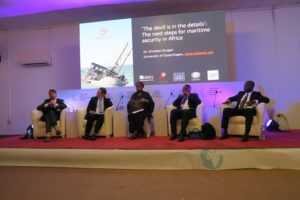The SafeSeas network on maritime security, held a one day workshop on February 28th at the University of Bristol on the challenges that arise for the UK in managing and securing the sea. The event featured a range of high level UK governmental representatives as well as academics from the UK which explored together the threats and risks the UK has to deal with, how to achieve synergies between the wide array of maritime security agencies, and how to balance the tasks at home and abroad.
I chaired one of the three panels, which was particularly concerned about inter-agency coordination and increasing efficiency in maritime security governance. The panel in particular highlighted the importance of trust between practitioners as the key to achieve better coordination.

